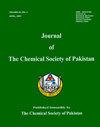北塞浦路斯蜂胶合成氧化铁纳米颗粒及其对MDA-MB 231细胞的抑菌抗癌作用
IF 0.5
4区 化学
Q4 CHEMISTRY, MULTIDISCIPLINARY
Journal of the chemical society of pakistan
Pub Date : 2023-01-01
DOI:10.52568/001288/jcsp/45.04.2023
引用次数: 0
摘要
纳米技术的研究在过去的几十年里取得了很大的进展,探索生物相容性纳米粒子的总体应用及其抗癌特性是有目的的。本研究旨在研究生物相容性北塞浦路斯蜂胶提取物氧化铁纳米颗粒(PE-Fe2O3-NPs)对体外人乳腺癌细胞系MDA-MB-231上皮细胞的细胞毒性作用。利用蜂胶提取物制备PE-Fe2O3-NPs,并利用紫外可见光谱、傅里叶变换红外光谱、扫描电镜和x射线衍射分析等方法对其进行表征。PE-Fe2O3-NPs在350 nm处具有独特的表面等离子体共振带。制备的PE-Fe2O3-NPs粒径为108 nm, zeta电位为+33.9 mV,具有良好的稳定性,而Fe2O3-NPs粒径为89.40 nm。抑菌结果表明,与不同蜂胶提取物浓度的PE-Fe2O3-NPs相比,Fe2O3-NPs对被试微生物具有最高的最小抑菌浓度和最小杀菌浓度。这表明,无论是Gram-ve还是Gram+ve, PE-Fe2O3-NPs在较低剂量下对致病菌具有更有效的杀灭作用。PE-Fe2O3-NPs有效地阻止了MDA-MB-231癌细胞系的扩散,因此,在抗癌生物医学用途上是值得称赞的。本文章由计算机程序翻译,如有差异,请以英文原文为准。
Synthesis of Iron oxide Nanoparticle using Propolis from Northern Cyprus and Evaluation of its Antibacterial, Anticancer Potential on MDA-MB 231 cells
Research in nanotechnology has progressed in the last decades, and it is purposeful to explore the applications of biocompatible nanoparticles in general and their anticancer attribute specifically. This study is aimed at examining the cytotoxic effects of biocompatible Northern Cyprus propolis extract of iron oxide nanoparticles (PE-Fe2O3-NPs) on MDA-MB-231 epithelial human breast cancer cell line, in vitro. Propolis extract were used to obtain PE-Fe2O3-NPs and further characterized using several methods like ultraviolet-visible spectroscopy, Fourier-transform infrared spectroscopy, scanning electronic microscopy and X-ray diffraction analysis. The PE-Fe2O3-NPs has a distinctive Surface Plasmon Resonance band at 350 nm. The prepared PE-Fe2O3-NPs had a size of 108 nm by diameter with a zeta potential of +33.9 mV which indicates a good stability of the nanoparticles’ while the size of Fe2O3-NPs was 89.40 nm by diameter. Antibacterial result showed that Fe2O3-NPs has highest Minimum Inhibitory Concentration and Minimum Bactericidal Concentration as compared to PE-Fe2O3-NPs with different concentration of propolis extract as regards the tested microorganisms. This indicates that PE-Fe2O3-NPs possesses a more effective threat to eliminating pathogenic bacteria at lesser dosages, be it Gram-ve or Gram+ve. PE-Fe2O3-NPs effectively halted the spread of MDA-MB-231 cancer cell lines and thus, prove to be commendable for anticancer biomedical uses.
求助全文
通过发布文献求助,成功后即可免费获取论文全文。
去求助
来源期刊
CiteScore
1.30
自引率
14.30%
发文量
41
审稿时长
3.4 months
期刊介绍:
This journal covers different research areas in the field of Chemistry. These include; Analytical Chemistry, Applied Chemistry, Biochemistry, Environmental Chemistry, Industrial Chemistry, Inorganic Chemistry, Organic Chemistry and Physical Chemistry. The journal publishes full length articles and Reviews from researchers in academia in addition to featuring comments. Chemical Research presents short, concise and critical articles offering easy-to-read overviews of basic research and applications in all areas of chemistry.

 求助内容:
求助内容: 应助结果提醒方式:
应助结果提醒方式:


